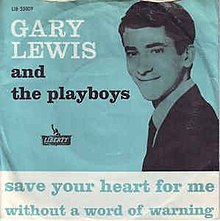| "Save Your Heart for Me" | ||||
|---|---|---|---|---|
 | ||||
| Single by Gary Lewis & the Playboys | ||||
| from the album A Session with Gary Lewis and the Playboys | ||||
| B-side | "Without a Word of Warning" | |||
| Released | June 1965 | |||
| Genre | Pop | |||
| Length | 1:56 | |||
| Label | Liberty | |||
| Songwriter(s) | Gary Geld, Peter Udell | |||
| Producer(s) | Snuff Garrett | |||
| Gary Lewis & the Playboys singles chronology | ||||
| ||||
"Save Your Heart for Me" is a song written by Gary Geld and Peter Udell. The song was originally written for and recorded by singer Brian Hyland in 1963. Although not released as a single in its own right, it was the B-side to Hyland's song "I'm Afraid to Go Home" and appeared on Hyland's 1994 greatest-hits album. [1]
Contents
"Save Your Heart for Me" is best known in a version recorded in 1965 by American pop group Gary Lewis & the Playboys and appears on the group's 1965 album A Session with Gary Lewis and the Playboys . Lewis and his band released their version as a single in June 1965, and it peaked at number two on the Billboard Hot 100 chart the week of August 21, 1965, behind "I Got You Babe" by Sonny & Cher. [2] It went to number one on the Billboard easy listening chart for three weeks in August 1965. [3] Patty Duke covered the song on her 1965 album Don't Just Stand There. [4] The song was covered by Livingston Taylor in 1993 on his album Good Friends .
Lewis credited the success of the record both to producer Snuff Garrett and to the short length of the song. Since it was less than two minutes in duration, Lewis has stated that "(I)t was played everywhere. Deejays loved it." [3]
This song is noted for Lewis's whistling, which is heard in the instrumental introduction, as well as in the brief instrumental portion, before Lewis concludes the song.